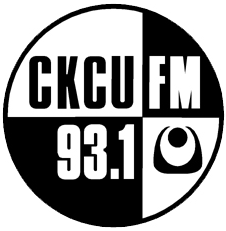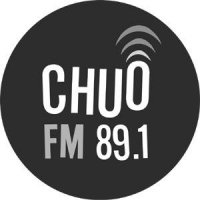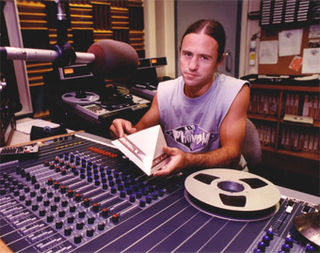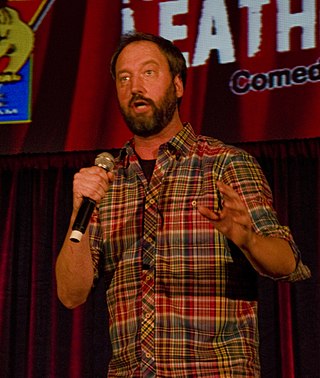CFRA is a news/talk formatted radio station in Ottawa, Ontario, Canada, owned by Bell Media. The station broadcasts on the assigned frequency of 580 kHz. CFRA's studios are located in the Bell Media Building on George Street in Downtown Ottawa's ByWard Market, while its 4-tower transmitter array is located near Manotick.

CKCU-FM is a Canadian campus-based community radio station, broadcasting at 93.1 FM in Ottawa and www.ckcufm.com, and offering live and archived on-demand audio streams from its website. The station broadcasts 24 hours per day, 365 days per year.

CHUO-FM is a Canadian community-based campus radio station, broadcasting at 89.1 FM in Ottawa, on Rogers digital cable on channel 943, via RealAudio stream and in MP3. It is the campus radio station of the University of Ottawa, a member of the National Campus and Community Radio Association in Canada, and a member of the world community radio association AMARC.

CHEZ-FM is a Canadian radio station broadcasting a mainstream rock format in Ottawa, Ontario. The station is owned by Rogers Radio, a division of Rogers Sports & Media. CHEZ's studios are located at the intersection of Thurston Drive and Conroy Road in Ottawa, while its transmitter is located in Camp Fortune, Quebec, within Gatineau Park.

CKKL-FM is a commercial radio station in Ottawa, Ontario. Owned by Bell Media, it broadcasts a country format branded as Pure Country 94. CKKL's radio studios and offices are located in the Bell Media Building on George Street in Downtown Ottawa's ByWard Market.
Ken Rockburn is a Canadian radio and television journalist and host. He is most noted for his associations with the Canadian Cable Public Affairs Channel (CPAC), the Canadian Broadcasting Corporation and CHEZ-FM radio.

Geoff Pevere is a Canadian lecturer, author, broadcaster, teacher, arts and media critic, currently the program director of the Rendezvous With Madness Film Festival in Toronto. He is a former film critic, book columnist and cultural journalist for the Toronto Star, where he worked from 1998 to 2011. His writing has appeared in several newspapers, magazines and arts journals, and he has worked as a broadcaster for both radio and television. He has lectured widely on cultural and media topics, and taught courses at several Canadian universities and colleges. In 2012, he contributed weekly pop culture columns to CBC Radio Syndication, which were heard in nearly twenty markets across Canada. He has also been a movie columnist and regular freelance contributor with The Globe and Mail.

CJET-FM is a commercial radio station licensed to Smiths Falls, Ontario, and serving the Ottawa Valley and National Capital Region. The station is owned by Rogers Radio, a division of Rogers Sports & Media. It broadcasts an adult hits format and is branded as Jack 92.3.

Scott Page is an American musician, technologist and entrepreneur known for his saxophone and rhythm guitar work with Pink Floyd, Supertramp and Toto.

Cowboy Who? was an original 45 episode children's television series in Canada, which aired in a half-hour Sunday morning timeslot between 1990 and 1994 on the MCTV system. The show was a collaboration between then radio producer Jeff Green and the children's theatre group Salt & Pepper Theatre Company. In 1987, the Salt & Pepper Theatre Company had written and performed an 8-part series of 30 minute children's radio programs for Ottawa album oriented rock station CHEZ-FM on which Green had acted as producer and engineer. In addition, the theatre group had been involved with CHRO-TV, supplying children's theatre workshops in schools throughout the Ottawa Valley. When the Salt & Pepper Theatre Company were offered a regular slot on the station to help fulfill its CRTC license commitments for original local children's programming, they approached Green to collaborate on a series. In 1990, the team produced a pilot for Cowboy Who?, which gained them a commitment for a season of 13 episodes, and primary shooting began in the fall of that year. Two and a half more seasons were eventually created. The show spent several years in rotation on the MCTV stations.

Soundings is a radio drama series produced from 1985 to 1989 in Ottawa by multimedia artist Jeff Green. Episodes were generally in the science fiction genre.
Midnight Stranger (1994) is the first of two published interactive multimedia CD-ROM based collaborations between writer and director Jeff Green and the Animatics Multimedia Corporation. Noted for its cinéma vérité style, it is a Point Of View (POV) video-based experiment in simulated socializing that takes place in an anonymous city late one night. Players navigate between several locations, and can interact with one or more people in each location to varying effects based on the player's "reactions" to that person. The main technical innovation of Midnight Stranger is its use of an emotional continuum Mood Bar for interaction with the in-story characters rather than a text interface or an itemized set of options for each interaction. The Mood Bar simulates some of the frustration and uncertainty when dealing with other people in social situations, and provides a more realistic role playing experience.
Medium Rare was a Canadian radio program, which aired from 1987 to 1993. Produced by CHEZ-FM in Ottawa, the program was syndicated to several radio stations across Canada.
Eight Seconds was a Canadian synthpop/progressive rock band formed in 1982 in Ottawa. They are perhaps best known for their 1986 single "Kiss You " which peaked at #14 in 1987 and was on the charts for 28 weeks in Canada from the album Almacantar. The band's lineup included Andrés del Castillo (vocals/guitar), March Cesare (bass), Frank Levin (keyboards), Scott Milks (drums), and Marc Parent (guitar).

Michael Thomas Green is a Canadian-American comedian, show host, actor, filmmaker, podcaster, and rapper. After pursuing stand-up comedy and music as a young adult, Green created and hosted The Tom Green Show, which aired on Canadian television and later on MTV between 1994 and 2000. The show became popular for its shock comedy, absurd pranks and Green's manic persona, and influenced later series such as Jackass and The Eric Andre Show. Green has also appeared in the Hollywood films Road Trip (2000), Charlie's Angels (2000), Stealing Harvard (2002), and Shred (2008). Green additionally directed, co-wrote and starred in the cult film Freddy Got Fingered (2001). He was briefly married to actress Drew Barrymore (2001–2002), who co-starred with him in Charlie's Angels and Freddy Got Fingered.

Adrian Harewood is a Canadian television and radio journalist, and the anchor of CBOT's CBC News: Ottawa at 5/5:30/6 and CBC News: Late Night in Ottawa.
Derek Diorio is a Canadian writer, director, producer, and actor.
Zoo Legacy is a hip-hop/indie-rock band from Ottawa, Ontario, Canada. Formed in 2010, the band consists of brothers Samuel and Dominic Goss (guitars). After successfully recording a demo of material, the brothers enlisted the talents of friend and local rapper Nicholas Pouponneau in the summer of 2010, who began rapping verses over the instrumental tracks they had previously written. They obtained their name by combining the previous stage name of Pouponneau and a neighborhood park the Goss brothers spent time in visiting family in South Africa. Throughout the years, they have shared the stage with acts such as Lauryn Hill, Kardinal Offishall, Classified, Shad, Ubiquitous Synergy Seeker, Son Real and Bad Bad Not Good. Their sound has been likened to artists such as The Weekend, The XX and Atmosphere.
Harsha Venilal Dehejia is an Indo-Canadian allergologist, author, and radio host, and Professor of Indian Studies at Carleton University. He was the winner of the 2003 Raja Rao Award for Literature for outstanding contributions to the literature and culture of the South Asian Diaspora, and the host of the radio show An Indian Morning for over 40 years.
Mode (1996) is the second of two published full motion video (FMV) interactive multimedia CD-ROM based collaborations between writer and director Jeff Green and the Animatics Multimedia Corporation.











